Fiction
Nonfiction
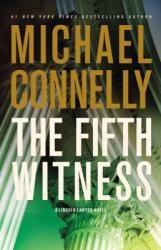
In the fourth installment of The Lincoln Lawyer series, The Fifth Witness
follows Mickey Haller as he navigates another murder trial. This time, the
real scenario of the foreclosure crisis is brought in to help set the stage
for the trial. Using a historical event like this helped to bring the story
together in a way that felt more real and relatable than the previous entries
in the series. Most Americans I know who were affected by the housing market
crash would certainly be entertained by this story of corruption and
underhanded dealings, if for no other reason than to justify how screwed up
the system is.
Gone from this part of the series is detective Harry Bosch, who I felt
distracted from the main storyline centering around Mickey Haller and his
court battle in the previous two books of this series. This time, it’s all
Mickey. What helped to make this book stand out from the rest was the amount
of soul-searching and character development our favorite defense lawyer does
throughout the events unfolding around this trial. Because of his work as a
defense attorney, it was easy for him to become cynical, thus making his
aloof attitude more entertaining than endearing. This time around, he starts
to become self-aware and sees that his life isn’t heading in the direction
he wants.
I appreciated the slight bit of meta-humor in this book, not only in its
title but considering it came out around the same time as The Lincoln Lawyer
(2011) movie. And while some of the numerous “sudden evidence” events for
the trial was a bit of a cheap way to add twists to the story, Connelly
expertly hid the true twist ending until the final moments of the book,
something that was somewhat missing from earlier parts of the series. With an
interesting nod toward some future storylines, I felt The Fifth Witness is
the strongest entry in the series so far.
A great courtroom drama pulled straight from the housing crisis, I give The
Fifth Witness 4.0 stars out of 5.
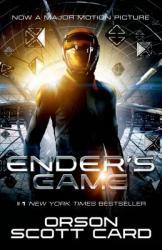
In another “lapse” of my reading habits, I didn’t manage to read
Ender’s Game until the movie of the same name came out in 2013. At the
time, all the sci-fi fans were eagerly anticipating a film that had taken
over 25 years to finally become a reality. While I thought the movie was
quite well done and engaging, after I read the book, I can understand why
some of the diehard fans of the series were disappointed. As is usually the
case with book-to-movie transitions, sub-plots often find themselves on the
cutting room floor. Of course, I don’t blame them for cutting what they
did; after all, it is called Ender’s Game.
Even though watching the movie first spoiled the exciting twist of the ending
when I read the book, I almost read the book differently knowing how it would
turn out. I could see the signs leading up to the shocking reveal, almost as
if I had read it before. I did appreciate the sub-plot with Ender’s
siblings and their efforts back on Earth as their brother was winning the war
in space. If anything, it helped to break up the intense action surrounding
the eponymous main character so that the reader could fully absorb what was
happening in the universe on a political level as well as a military one.
It is disappointing that there will likely be no more movies in this series
since the source material is full of interesting ideas that I’d like to see
on the big screen. Perhaps the series would be better suited for a television
show (a la Game of Thrones) to fully include all the different elements that
made it a classic of sci-fi back in 1985. Either way, I look forward to
exploring more of Orson Scott Card’s universe in the next book of the
series: Speaker for the Dead.
A fantastic sci-fi story with an incredible twist ending, I give Ender’s
Game 5.0 stars out of 5.

What a world we live in! It’s exciting to see a self-published book receive
such attention, eventually becoming a New York Times bestseller! Truly, if a
writer is talented enough with a good enough story, they can make it in this
over-saturated market. And while some of my love for this book comes from my
hopes of eventually being “discovered” as a self-published author, most
of it comes from my love of scientific realism in fiction. Truly, this is
more of a challenge than world-building in a fantasy genre, because in order
for it to be believable, it must obey the laws of physics.
But let’s get down to brass tacks here. There is no doubt that Andy Weir
did his homework on this book. In fact, some sections almost read like the
output section of a very complicated spreadsheet (which I certainly
appreciate, on a personal level). Even with the technical detail to keep the
story grounded in science, the successive cause-and-effect events that
eventually lead to the climax of the story give the reader equal amounts of
elation and heartbreak right along with the protagonist, Mark Watney. Still,
the problem solving accomplished in this novel merely proves how smart we are
as a species today, and how the vast knowledge of the universe has catapulted
us into the very realistic scenario portrayed in the pages. In fact, Weir’s
methodical approach really gives the reader a scale of how big an operation a
trip to (or from) Mars would be.
Even though the science is front and center, the whole reason we read these
almost intimate logs of a Martian astronaut is because the characters are so
well written. With a humor and spunky attitude that help alleviate his dire
situation, Watney almost comes across as a genius “everyman” in that most
of his solutions could be arrived at with a little bit of thought and
ingenuity. And while the majority of the book centers around Watney’s logs,
every minor character has a depth and expertise that helps to propel the
story forward.
A fast and fun read full of excitement and ingenious science solutions, I
give The Martian 5.0 stars out of 5.
For more reviews of books and movies like this, please visit
www.benjamin-m-weilert.com

From the title of this book, I would have expected it to be about the
aftermath of an apocalypse-inducing event. If anything Echo of the Boom is a
misnomer and the book should be titled Prelude of the Boom. The cover also
doesn’t give much into what it’s about, other than the four different
points of view which are followed throughout the narrative.
While I did eventually like the book, it took too long to get there (some of
the occasional typos didn’t help me get into it either). With the
characters’ motivations unclear from the start, it becomes obvious about
150 pages in that nothing is really going to happen in this book. Instead of
having any driving force propelling the characters forward, it’s more
accurate to describe this book as a nearly 500 page rap battle. Each
character has their own track, living their lives the way many teenagers
today might (which in itself is a scary thought), but occasionally the tracks
mix together albeit briefly and with little perturbation to the individual
characters. At least the words the author uses are artistic and articulate,
making it fun to read.
Honestly, the very last sentences of this book made me want to read what
happens next much more than what had already been written, since it sounded
like it was going to be much more interesting than the origin stories of
these characters. If the author’s opinions and worldviews weren’t so
blatantly obvious through this book, it might have been interesting as a
“slice of life” novel, but at least he has something to say (even if
it’s regularly redundant). If anything, this book should give parents the
motivation to be more actively involved in their teenagers’ lives, lest
they end up with the motivation to destroy all systems of authority if for no
other reason than pure anarchy.
A rewarding read that takes some getting used to; I give Echo of the Boom 4.0
stars out of 5.
For more reviews of books and movies like this, please visit
www.benjamin-m-weilert.com
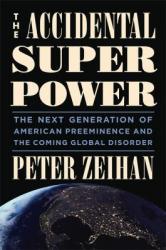
I can’t remember when or why I added this book to my “to-read” list on
Overdrive, but I’m certainly glad I did. While it’s a little dated from a
2017 perspective, The Accidental Superpower is an incredibly insightful book
that helps to peel back the onion of global politics and economics to reveal
the underlying factors that are, and have been, shaping the world into what
it is today. As a bonus, after reading this book, I have a better
understanding of how countries and societies develop from a geographical and
economic standpoint and can use these insights to aid in the world-building
for a few of my upcoming novel series.
Right from the get-go, The Accidental Superpower opened my eyes to the
obvious: geography determines economy. Mountains separate areas almost as
well as oceans do, but the best economies are the ones that can move their
goods about in the fastest and most efficient ways. As luck would have it
when first colonizing the United States, the founding fathers had no idea
just how immensely fortunate they would be with the geography to their west.
Peter Zeihan expertly shows how other countries have geographic problems that
are keeping them from being nearly as united as the United States.
However, disaster is soon upon us. The demographic changes throughout the
world will soon impose strains on all economic systems. While the world will
continue to be in crisis due to its geographies influencing the economies of
its various nation states, the United States is the only one holding it all
together, mostly due to our generosity of offering “free trade” after the
end of World War II. If we pull that rug out from underneath the world, we in
the U.S. will likely survive, but at the cost of the global economy
collapsing.
A must-read for anyone who exists in this global economy, I give The
Accidental Superpower 4.5 stars out of 5.
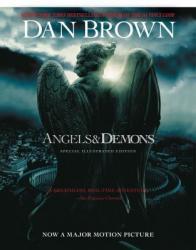
While Angels and Demons is not nearly as popular as its sequel, the famous (if not infamous) The Da Vinci Code, the elements which led to its successor’s success are certainly all contained within this first book in the Robert Langdon series. Of course, just because you have the materials to build a nice house doesn’t mean that it magically becomes a mansion. Despite containing many of the elements that made The Da Vinci Code so good, Angels and Demons feels a little underdeveloped in quite a few areas.
First, the protagonist, Robert Langdon, is supposed to feel like an “Indiana Jones”-type character, but with a specialty like symbology as his background, I just can’t buy the action-hero transformation of this everyday academic. Add to this the almost repetitive nature of his “discoveries” wherein he makes an assessment, then goes to the location of the assessment only to find that he didn’t think of it in the right way and thus requiring the whole plot to shift gears as he rushes to the new location. He eventually had better predictions, but by then it felt repetitive.
Secondly, the whole “treasure hunt” to find the antimatter (of which I feel CERN is a more recognizable name than it was back in 2000) seemed to take a back burner to the parallel plot of the pope’s death and finding his replacement. It is hard to focus on both plotlines, especially since both of them had pretty predictable endings. Finally, the romance aspect of this novel seemed quite forced, even to the point where the final scene of the book felt like it was ripped out of a James Bond story. Wherein a modicum of charm from the male protagonist makes his female counterpart swoon with undying affection that wasn’t in any part of the prior plot.
A rough start to the Robert Langdon series, I give Angels and Demons 2.5 stars out of 5.
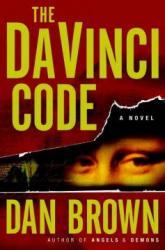
What a difference three years makes! Even though it contains all the same tropes and motifs that Angels and Demons did, The Da Vinci Code eliminates the fluff and focuses on the strengths of these individual pieces to create an enthralling adventure through Christian history. I will admit that I first read this book because I was curious about the controversy that surrounded it. While Dan Brown is a fantastic storyteller, and many of his connections and links to Christianity made sense, I still maintain that, at its core, The Da Vinci Code is just well-written fiction.
This time around, Robert Langdon is much better suited for the task of finding the “Holy Grail” instead of being a glorified Roman tour guide. His expertise in symbology certainly helped to drive the plot forward, even if it sometimes was in a misleading direction for the sake of a twist. I did appreciate how, even if a clue didn't immediately come into play, it became useful later to help round out the plot. It wasn’t just a series of “find me a rock” exercises but had a parallel set of intersecting strings and subplots that drove the story forward to its exciting conclusion.
And while the female protagonist was much more developed than the one in Angels and Demons, the villains also had more depth to them as well. Instead of a few individuals using the name of a huge organization like the Illuminati to create the conflict, a singular man with a singular goal helped to create the “chase” that propelled Robert Langdon across Christendom to find the Holy Grail. While both The Da Vinci Code and Angels and Demons share almost identical plot structures, the former shows that the execution of such a story is precisely what makes one a great read and the other an exercise in eye-rolling.
An exciting treasure hunt filled with fictional historical connections, I give The Da Vinci Code 4.0 stars out of 5.
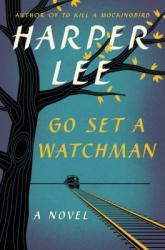
Part of the problem of releasing a sequel to a beloved book 55 years later is a lot of other books have been written in between them. Consequently, there have been successful books written with some of the exact same plot and motifs, thus making the sequel feel like a rip-off instead of the other way around. In the case of Harper Lee’s Go Set a Watchman, I found myself drawing plenty of comparisons to Kathryn Stockett’s The Help (2009).
While I felt the time-frame of Go Set a Watchman to be somewhat ambiguous, most of the similarities between it and The Help were in their heroines. Both were southern-born-and-raised women who smoked, were outsiders, and weren’t going to stand for racism. And while the main character of The Help did something about it, Jean Louise “Scout” Finch merely fell apart at the realization that everyone around her, including her closest family, was racist. Unfortunately, this makes for a pretty thin storyline, which was why defining moments from the last twenty years of Scout’s life are interspersed to fill in some of the character development. I almost wish there was a little more time given to the changes left unexplained in the 20-year interim, like what really happened to Scout’s brother.
Despite its weaknesses, Go Set a Watchman does share some similarities with its predecessor, and not just in setting and characters. While I was about ready to completely brush this book off as another version of The Help, the monologues at the end of the book really made the read worth it. Much like the courtroom arguments for a man’s innocence in To Kill a Mockingbird (1960), the soliloquies of these characters were deep and probing and really made me think about my place in a society with its current racial tensions.
An adequate extension of its predecessor, I give Go Set a Watchman 3.5 stars out of 5.
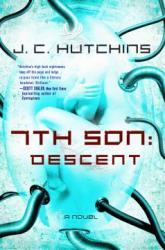
I managed to find this book on a table full of free books at a convention some time ago and tucked it away in my “to read” pile. Now that I’ve finished most of the Goodreads giveaways I have received, I decided to give it a read. With nothing other than the title (which doesn’t tell me much) and the cover (which gives a little more information), I honestly didn’t know what to expect from this book. Since it was on a table of free books, I didn’t have much expectation for it, but boy did it ever deliver!
With a fantastically engaging idea and a blisteringly fast execution, 7th Son: Descent pulled me in from the get-go and wouldn’t let go. Action! Espionage! Science! Without ever becoming too mired in the details (but providing enough to have the plot make sense), this book successfully made a story about cloning that wasn’t trite or cliché. The ideas and characters contained within were unquestionably too big for this book since it introduced many subplots but never concluded them. Still, there was enough of a conclusion to this book to leave me satisfied without it being too much of a cliffhanger.
My one qualm with 7th Son: Descent, other than the brief, horrifying moment of implied violence involving a pneumatic socket wrench, was that there were almost too many characters. I understand that there needed to be a well-rounded group of clones, but I honestly couldn’t tell you anything significant or memorable about at least two of them. I mean, you have the free-spirited musician, the conspiracy-nut hacker, the gay marine, the priest, and the egomaniac criminal psychologist, but I guess the U.N. employee and the other guy (I can’t even remember what he did) didn’t stand out to me. Maybe they play a bigger role in the later books, but they seemed undeveloped in this one.
An excellent, action-packed science fiction book that left me wanting more, I give 7th Son: Descent 4.5 stars out of 5.

When I first heard about Ready Player One (2011) years ago, I was excited an author would even try to capture the spirit of the hardcore pop culture lover. After I received a hardcover copy of that book for Christmas, I devoured every word and loved every moment of it. This was why, when I saw Ernest Cline had written another book appearing to be in the same vein of Ready Player One, I had to buy it and give it a read. This book was Armada.
Unfortunately, I was not nearly as impressed with Armada as I was with Ready Player One. In Armada, the pop culture references were there, but almost to the point of oversaturation. There were plenty of references I didn’t understand because I haven’t encountered the source material, which was somewhat frustrating. Furthermore, what made the references entertaining and fun in Ready Player One was that they were tied to unravelling the mystery and linking each clue to the next one; in Armada, they were merely the mating call of the nerd.
And while Armada has a few scenes of immersive action that are incredibly well written, the plot is quite lacking. The first “reveal” (if you can call it that) was predictable and the motivations of the antagonists were weak at best, almost as if he had written himself into a corner and didn’t know how to resolve the story in a satisfying way. In fact, the huge numbers of pop culture references actually made the story seem less original, as it pretty much came across as Ender’s Game (1985), and the narrator told you as much.
A story with a potential it never quite lived up to and a shadow of the author’s previous book it could never come out from underneath, I give Armada 3.0 stars out of 5.
For more reviews of books and movies like this, please visit www.benjamin-m-weilert.com.
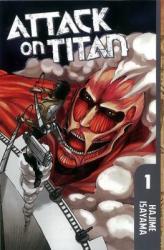
Ever since I discovered this series, I've been hooked. The story is just so interesting and unique. I mean, how many books do you read about man-eating giants destroying society and teenage soldiers fighting them. Not only is the plot interesting, the characters are very well developed and their backstories are very interesting. That being said, there aren't too many backstories, because most of them are dead, but still, the main characters' backstories are really creative and awesome. I have read these books so many times and I am still hooked, even though it sometimes makes me mad (because the characters I like all keep dying). 10/10. Highly recommend if you are okay with violence, blood, guts, and disturbing images.
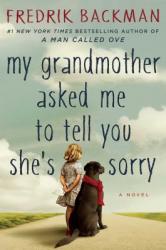
Backman's wit and humor ties in wonderfully with a tear-jerking finale. From beginning to end, I was torn between laughing and weeping. The innocence and wonder of childhood is captured perfectly, while also conveying the struggles of not being noticed. The grandmother in this story is eccentric and diligent, striving to create beauty for her granddaughter. Backman paints a masterpiece with his words, and keeps me hooked and enthralled at every turn of this book. I recommend this book heartily!
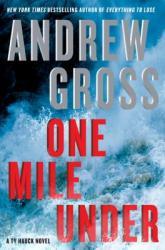
Review: The book, One Mile Under, is about a girl, who is a white water rafting guide living in Aspen, Colorado, who finds a body on one of her rafting trips. Throughout the book the girl, with some help from a few friends, tries to prove that the death of the man was no river accident while also trying to avoid being murdered herself. I chose this book because I though the title seemed interesting, and I had read some of the author's other books and liked them. The thing I liked most about this book is that it is a murder mystery, and it is very suspenseful throughout most of the book.
However, the book seemed to drag on a lot towards the end, and most of the answers to the mystery are revealed about two-thirds through the book which makes the book feel long. This book was surprising in the beginning, but by the end everything seemed pretty predictable. Overall, it was a really good book, and I would suggest reading it if you like suspenseful murder mysteries.
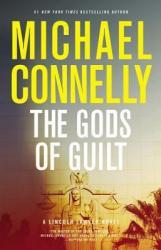
Despite The Fifth Witness leaving the door open to an interesting diversion from the same defense lawyer story we’ve come to know and love from Michael Connelly’s Mickey Haller, The Gods of Guilt puts Haller back in the hot seat as the counsel protecting a digital pimp from a murder conviction. Some of the depth of the Haller character developed in previous books in this series was eliminated after his unsuccessful District Attorney run, but there was still enough humanity in him to advance his story. After all, his coping mechanisms and needs are some of what we all deal with in our own lives.
While I have come to expect a twist ending from Connelly, it was surprisingly missing from this book. For once, Haller’s client wasn’t as bad as everyone made him out to be, and that’s saying something for the digital pimp of Andre La Cosse. Perhaps that’s what made this story a little more uncomfortable than the others: the seedy underbelly of the adult entertainment industry is harder to relate to than simple foreclosures. Still, I can’t help but think that the same strawman tactics that Haller used in this case were quite similar to some of his other defense cases.
All this being said, Connelly is still a master of his craft. The pacing and advancement in the plot was excellent and the peril Haller found himself in after getting too deep into some serious side-investigations helped to make a rather standard book in the series an entertaining read, nonetheless. As was the case in The Fifth Witness, I appreciated the meta nature of this universe where the Lincoln Lawyer movie was a real part of Haller’s life.
Yet another predictable entry in the Mickey Haller series, I give The Gods of Guilt 3.0 stars out of 5.
For more reviews of books and movies like this, please visit www.benjamin-m-weilert.com

***THIS BOOK WAS RECEIVED FROM A GOODREADS GIVEAWAY***
William Shatner, best known for his acting in the popular sci-fi series, Star Trek, is not someone who I thought would also be a writer. Of course, after reading Zero-G, I’m still not convinced, even with the help of ghostwriter Jeff Rovin. The book had an interesting premise, but the exposition and plot were so slow and clunky that it was hard to get into it. I will say there is an appreciation of the challenges of space in this book, but it almost plays a backseat to an aged government official trying to relive his glory days (sound familiar?).
If I were to re-write this book, it would have been considerably shorter, possibly even a short story. As it is, the first third of the book is almost useless, filled with detailed explanations of the characters’ backgrounds and relationships. Even the first action sequence only emphasized that the main character is reckless and flies by his own rules. When it came to the core of the plot, I never felt a sense of urgency to take out the threat of the space-weapon, mainly because it acted “randomly” (read: whenever it might suit to move the plot along).
For a book about an FBI station in space, the mystery solved by the deputy director seemed quite a bit beneath his station. In fact, I was surprised he even handled it since the whole case appeared to be obvious right from the start. There wasn’t enough development of the lesser characters to even know who they were and why they had any motivation to perpetrate the crimes they did. Aside from the main character, most of the character focus appeared to be on the gender-switching assistant, probably to make the book “hip” and “trendy” amongst the modern and liberal-leaning readers.
An interesting concept that falls flat on its face immediately after the prologue, I give Zero-G 2.0 stars out of 5.
For more reviews of books and movies like this, please visit www.benjamin-m-weilert.com

Having already blasted through the rest of the Mickey Haller series, I finally arrived at a book that didn’t center around the defense lawyer. Instead, The Crossing follows Harry Bosch, Haller’s half-brother (which we learned back in The Brass Verdict). I realize that Mickey Haller is merely a spin-off series from the main Harry Bosch series, so it was interesting to finally enter the main storyline of Connelly’s longest-running character. Now I see that he writes Bosch books in third-person, as compared to Haller’s first-person, which was why I was confused when the POVs switched in one of the previous books featuring both of them.
Coming into this series at the twentieth book was a little jarring to me, but not entirely disorienting. There were plenty of references to previous books I had not read; but by the sounds of them, these predecessors were certainly exciting. What probably helped with my transition into this series was that Bosch retired from his job in the police department, thus creating a new start for the character that could be used to explore some interesting scenarios without being burdened by the bureaucracy of his job.
While Connelly’s writing is still superb and suspenseful, the one aspect I found to be a bit unbelievable was Bosch’s innate sense of what was “wrong” with the current investigation. Just based on one single, minor detail, he was able to unravel the deeper conspiracy involving other, corrupt police officers. What if he hadn’t noticed? Would he have still managed to get to the bottom of the truth? Either way, I might have to pick up the earlier books in this series, just so I can get more of the story behind the briefly referenced excitement Bosch had to go through in the past.
Proof that sometimes it’s difficult to quit a job after having done it for so long, I give The Crossing 3.5 stars out of 5.
For more reviews of books and movies like this, please visit www.benjamin-m-weilert.com
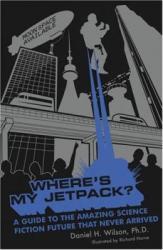
Some of the best science fiction ever written was strangely prescient with its predictions on how the world would advance, technologically. One of the best examples of this was Jules Verne in his story From the Earth to the Moon. Not only did he figure out what it would take to get away from Earth’s gravity, he predicted that the launch site would be in Florida. Ever since then, we have looked to the authors of science fiction to tell us what could be possible in the future of tomorrow.
Unfortunately, some of these predictions weren’t quite realistic. While jetpacks and moon colonies sound cool in the pages of a fictional book, they just aren’t practical in reality. Still, our childlike wonder and innovation tried its best to create what the science fiction authors of yore dreamt up. In Where’s My Jetpack?, Daniel H. Wilson does his best to explain where all these fantastical inventions and concepts are in their process toward being fully realized. But don’t worry about this being a stuffy tome full of complicated science. Wilson does a good job infusing humor with his research, which helps to show how ridiculous some of these ideas really are.
My one challenge with this book came with the fact that it was published back in 2007. It’s been 10 years since this book came out and now much of its research is either naively optimistic or didn’t pan out. What’s perhaps even more exciting is being aware of the technological developments that have made some of the impossibilities mentioned in this book at least somewhat plausible. Consequently, it’s best to read this book as a snapshot in the technological timeline that is our current reality.
A humorous look at the amazing technological developments inspired by sci-fi, I give Where’s My Jetpack? 4.0 stars out of 5.
For more reviews of books and movies like this, please visit www.benjamin-m-weilert.com

With the ever-increasing proliferation of “smart” technology throughout our society, the thought of a robot uprising remains fixed in the back of our minds. Since the introduction of the concept of robots decades ago, humans have feared their uprising to usurp us as the dominant sentient beings on our planet. Now, as we rely on our computers, smartphones, and connected devices to help run our lives, the threat of a full-on apocalypse resulting from their sentience seems more possible than ever.
Author Daniel H. Wilson has certainly done his research on the “what if” scenario of a robot apocalypse (or the titular Robopocalypse, if you will). He manages to build the progression of a robot-themed doomsday scenario from the machines we know and use today. Many of the machines’ decisions and strategic moves mostly make sense. That being said, I did have a few issues with the book and its structure. First off, the format of the book was remarkably similar to its zombie predecessor, World War Z. Secondly, the fact that it’s told through only a handful of characters helps to tie each piece together, but the fact that these characters are all connected to each other makes it less believable.
When it came right down to it, I had trouble connecting with these characters. In the earlier sections, it was a little easier to understand what was happening, but once the landscape of the robot war changed into one where the robots were winning; it was hard to grasp what was going on in a global sense. As it is, Robopocalypse is essentially a series of short stories with some familiar characters tying it together.
A semi-realistic look at a potential robot uprising with an already-used apocalyptic narrative format, I give Robopocalypse 3.0 stars out of 5.
For more reviews of books and movies like this, please visit www.benjamin-m-weilert.com
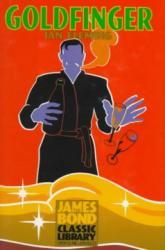
For many years, I was aware that the James Bond series of books did not follow the same order as their respective films. Given the action/adventure spy thriller genre these books were written in, it is possible to mix them around and still have a good understanding of what’s going on, even if some of the references made within the novels could only be understood by having read the previous books in the series. In some respects, it is disappointing that the film franchise didn’t capitalize on a continuous narrative that the books provided.
If the stories are out of order, then it ‘s hard to build up the constant battle between James Bond and the Soviet spy agency, SMERSH. Fortunately, since I had read a few of the first books in the James Bond series, I could appreciate Auric Goldfinger’s connection to the organization. That being said, I seemed to have jumped ahead a bit and missed what happened on the Moonraker mission, even if I have a loose idea/remembrance of what happened from its film version. Regardless, these minor references didn’t affect the plot of Goldfinger that much.
What I do find interesting with this book is the differences between it and the movie. There’s no laser threatening to cut Bond in half, there are more characters involved in the heist, and the actual heist itself has a slightly different objective. It is weird reading about the technology Bond uses and its references to “vacuum tubes” when the film makes all his tech seem futuristic. I do find it interesting how the author won’t outright swear (replacing the choice word with a “blank”) but includes two lesbian characters and a plethora of other, sexual inferences.
A fantastic story in the James Bond franchise, I give Goldfinger 4.0 stars out of 5.
For more reviews of books and movies like this, please visit www.benjamin-m-weilert.com

Having read Where’s My Jetpack? and Robopocalypse from Daniel H. Wilson, I had some high hopes for this book. Clearly, Wilson has a depth of knowledge about current and upcoming technologies that allows him to write succinctly both non-fiction and fiction. He can fuse the science with either humor or action and maintain an accurate sense of it without having the details bog down the plot. In Amped, Wilson explores a world where humans use technology to assist their bodies, either to overcome a disability or to overcome their humanity.
Unlike Robopocalypse, which was primarily a collection of intertwined vignettes, Amped follows a single individual through the effects of a fear-filled society charged by an inferiority complex. While the main thrust of the plot is about mental augmentation, there are mentions of other exciting technologies, including self-driving trucks and mechanical exoskeletons. Overwhelmingly, though, the brain-altering technology is the focus, as it hurtles the United States into two camps: ordinary people (aka “Reggies”) and “amps.” It was interesting to see how quickly discrimination came about in light of a clear delineation between humans and modified humans.
Even if the plot was a little hard to follow at times (perhaps due to me listening to it on an audiobook), the capabilities of the mental augmentation certainly felt realistic and plausible. While these embedded chips could solve many brain-related problems, the main point Wilson gets across is, “where does it end?” If we wipe out handicaps, can we also enhance ordinary people to super-human status? There’s certainly an interesting moral conundrum here, and I hope this fictionalized account will get people thinking about the answers before this reality is soon upon us.
Another great book warning about the potentials of future technology, I give Amped 4.0 stars out of 5.
For more reviews of books and movies like this, please visit www.benjamin-m-weilert.com


